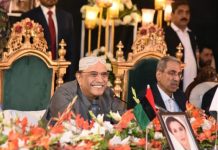Sabah Aslam
One of the frequently used models in international relations is ‘Alliance’, however, the alliance theory is one of the weakest theories in international relations, as alliance is always considered as a support to ‘system structure’ and ‘balance of power’. In the contemporary scenario, the study of making and maintenance of political processes of alliance is of utmost importance. Alliance – “a formal association of states for the use (or non-use) of military force, intended for either the security or the aggrandizement of their members, against specific other states, whether or not these others are explicitly identified.” Moreover, there is a clear distinction between wartime ‘Coalition’ and peacetime ‘alliance’. It can be either offensive or defensive, bilateral or multilateral, ad hoc or permanent etc.
Keeping in view the shifts in the international arena, the rise of the east is ‘inevitable’. Many having doubts but the ones confident of it, are in the making of new alliances to hinder or at least slow down the stride. The formation of new blocs or alliance par say in these difficult times of history seems eerie, when human security is at stake. People in Africa, Middle East, and in our very neighbourhood Afghanistan went through a lot because of these colonial powers and pseudo-human rights defenders. To safeguard their common interests, these colonial powers form alliances. Alliance to them is a “a unity of interest which will make the welfare of one the welfare of all, and the quarrel of one the quarrel of all; and in war, or rather for war, by inducing such measures of organization and defense as shall be felt by all to be a fair distribution of a burden of which each reaps the benefit.”
As mentioned by Alfred T. Mahan, “Whoever rules the waves rules the world”. Indo-Pacific due to its unique water-channel positioning makes it a geopolitical epicenter of the new political alliance system, rivalry, and making it epicenter of great-power competition. AUKUS – the Indo-Pacific alliance was launched by the three countries (Australia, U.K., U.S.) in September 2021. Australia, the U.K. and the U.S.working on a deep collaboration across a range of advanced military technologies, including cyber, artificial intelligence, quantum technology and undersea robotics. Moreover, the U.S., U.K. and Australia will also cooperate in developing hypersonic weapons and other advanced military technology. In the given circumstances, this cooperation would “undermine peace and stability in the Asia-Pacific region”.
Many security experts hold that AUKUS – a Asia-Pacific Version of NATO in making. By cooperating on military technology advancement including hypersonic weapons, AUKUS is now a security alliance rather than a non-security alliance. This initiative backed by the U.S. would put Australia in an awkward position as it would label Australia too as warmongering, reactionary and belligerent. However, this term Indo-Pacific was coined to counter the rise of the east as a bloc. It is to divide the eastern countries and push them into alliance with the western countries. It is also to lessen the influence of the regional powers like Russia and China. AUKUS and QUAD are basically part of the U.S. ‘s containment strategy to restrict the rise of East. Through this alliance system, the U.S. is trying to balance and uphold the status quo. The U.S. and U.K. by engaging with this part of the world is actually ensuring their own security. QUAD, AUKUS are actually meant to enhance their own relative power to maintain their positions in the international arena. This all has increased the pre-existing power competition in the very Indo-Pacific region. The impetus behind all these new alliance systems is to curtail the growth of China and to limit the Russian influence in the region. In addition, to be actively involved in the Indo-Pacific would enhance the U.S. ability to steer the balance of power in its favour. It is also an initiative to reinforce the Anglo-Saxon grouping in the Indo-Pacific region.
What is left with the major powers, is to develop a counter-alliance system and for that SCO is the best medium. Russia, China, Pakistan and other SCO should form a unique counter-balancing bloc to safeguard regional peace and stability. Regional prosperity is only possible through peace-time alliance. The strategic shift to geo-economics is the key for the SCO countries to cooperate and form a close association. It will not only counter the western influence but would also contribute in making individual state’s independent of western financial pressures.

















